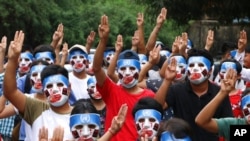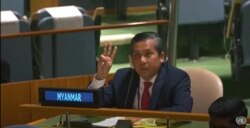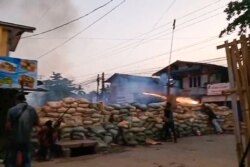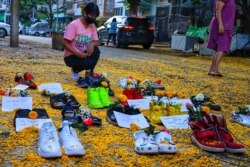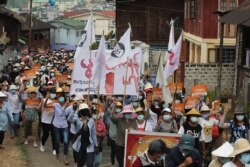Myanmar's U.N. envoy, who was appointed by the democratically elected government, appealed to the international community Friday to protect civilians from the country's military with a no-fly zone, arms embargo and targeted sanctions.
"It is necessary to have strong and urgent actions on the U.N. Security Council in order to save the lives of innocent civilians in Myanmar," Kyaw Moe Tun told an informal meeting of the Security Council. "Collective strong action is needed immediately. Time is of the essence for us, please take action now."
The envoy, who made headlines in February publicly opposing the military coup, called on the international community to target sanctions against the businesses linked to the military and to their families. He also urged the suspension of foreign investments until the democratically elected government is restored.
"I wish to stress that the international community and the U.N. Security Council have the responsibility to use all necessary means to help protect the people of Myanmar from atrocities, brutal and inhuman acts committed by the military, through collective, concrete and unifying action in a timely and decisive manner," the envoy said. In diplomatic speak, "all necessary measures" usually refers to military action.
Myanmar has been mired in chaos and violence since the military's overthrow of the civilian government on February 1, and the detentions of de facto leader Aung San Suu Kyi and other high-ranking officials of her National League for Democracy (NLD) Party.
The military has claimed widespread fraud in last November's election, which the NLD won in a landslide. Myanmar's electoral commission has denied the fraud claims. Since then, there have been daily peaceful protests across the country, which the military has brutally tried to put down. More than 600 civilians, including several children, have been killed in the streets and in their homes. Nearly 3,000 people have been arrested, according to the Assistance Association for Political Prisoners Burma.
Friday's U.N. meeting was organized by Britain, with support from the U.S. and European members of the 15-nation Security Council. British Ambassador Barbara Woodward said it was intended to hear "the perspectives of the people of Myanmar whose voices the military seeks to silence."
They included Zin Mar Aung, who is the acting foreign minister appointed by the group representing the ousted NLD lawmakers, known as the Committee Representing Pyidaungsu Hluttaw or CRPH.
She said the military's unrelenting excessive use of force shows it does not have control over the country.
"Our people are ready to pay any cost to get back their rights and freedom," Zin Mar Aung added.
"The streets of Yangon and in many parts of the country, are now strewn with yellow padauk flower, a symbol of new year for Buddhists, the religious majority," said civil society leader Sai Sam Kham. "Just as no one can keep the padauk from blooming, no one can stop the aspiration of young people who believe freedom and democracy is worth dying for."
He said the people would not tolerate a dictatorship or fake democracy.
"They are defiant and courageously defending their rights."
International Crisis Group Myanmar expert Richard Horsey gave a bleak assessment of the country's trajectory if the situation continues to unravel.
"To put it simply, Myanmar stands at the brink of state failure, of state collapse," he warned.
He said business is at a standstill and it is having ripple effects on the country's supply chains, which could lead to a food shortages. The health care system is in a state of collapse and, perhaps most concerning, ethnic armed violence is on the rise.
Council members called for U.N. Envoy Christine Schraner Burgener to be allowed to visit Myanmar. The envoy has been trying for weeks to secure the junta's agreement, but she tweeted on Friday that they have rejected her request.
The United States reiterated its solidarity with the people of Myanmar on Friday.
"So, to the people of Burma, if you can see this or hear this – and certainly our briefers can – I want you to know that the United States stands with you," Ambassador Linda Thomas-Greenfield said. "And we will do everything in our power, in coordination with our allies and our partners, here in the Security Council and elsewhere, to help you deal with this terrible situation."
She urged her fellow council members to take concrete action, saying the Myanmar military has ignored their condemnations.
"Will we allow the military to destabilize the region, plunging Burma into further violence and chaos, or will we hear the calls of the people of Burma, and help them achieve the free, open, and peaceful country we all know that they deserve?" she asked, using the other name by which Myanmar is known. "To me, the answer is clear. We have to act."
Council member Estonia said it is time the council draft a strong resolution.
"The United Nations Security Council is the only entity in the world which has the legitimate power to protect nations at risk, and must explore every tool in its toolbox to end this horrible situation," Ambassador Sven Jürgenson said. "To this end, we should start drafting a resolution that could also foresee sanctions, especially a comprehensive arms embargo, in order to stop the atrocities. All states must refrain from supplying the perpetrators with weapons."
Dozens of states have implemented bilateral arms embargoes on the junta, but the council has not, most likely because China would block such a move.
Beijing's representative said her government is concerned about the violence and bloodshed, which "serves no one's interests." She said China would continue to maintain contacts and communication with the parties "in its own way to deescalate the situation."




